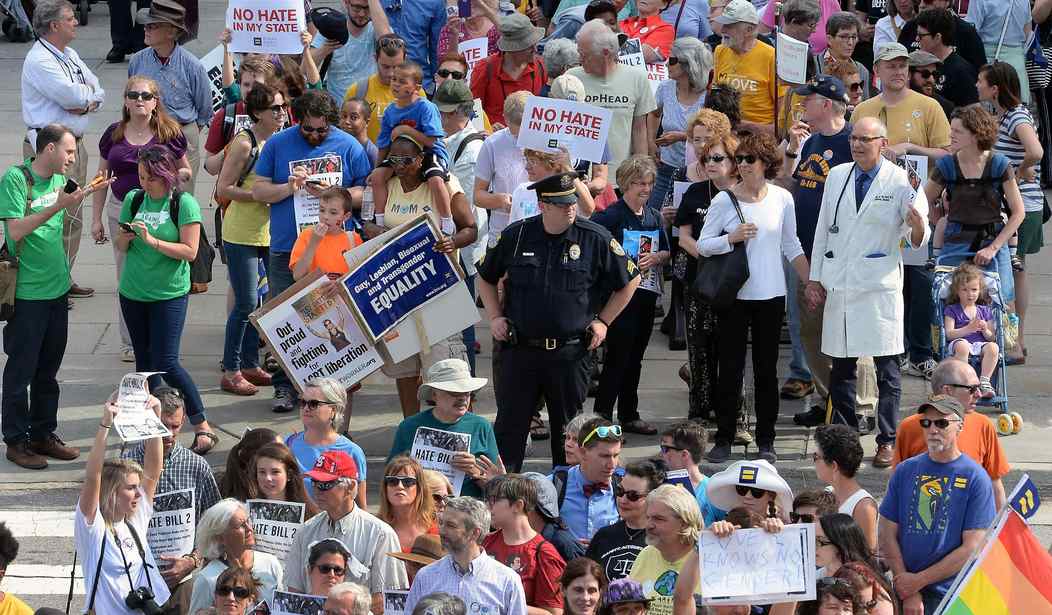Close to a year after H.B.2 was introduced in North Carolina and lit a fire under a nationwide debate over LGBT rights, North Carolina has not moved beyond the so-called bathroom bill.
Candis Cox, a transgendered woman, is still wondering which restroom she’ll be allowed to use.
“What we’re seeing is a kind of holding of the breath,” Cox told the New York Times. “That’s where we’re at right now because we were dealt this awful blow, and it’s waiting for the other shoe to drop. We don’t know where we are.”
Cox, along with an estimated 44,749 other transgendered people living in North Carolina, might find out where they are soon. And if top North Carolina Republicans have anything to say about it, Cox and the others on her side of the debate won’t like what they learn.
Gov. Roy Cooper (D) and the ACLU of North Carolina have proposed a consent decree to settle a lawsuit against H.B. 142, the legislation that replaced H.B. 2, the law that forced Cox and others to use the bathroom that matched their birth gender.
The ACLU and LGBT-rights activists didn’t like H.B. 142 because it also allowed the North Carolina General Assembly to make rules about public bathrooms. It would have also prevented municipalities in the state from creating their own rules.
“H.B. 2 and H.B. 142 remain shameful and discriminatory attacks on LGBT people that should never have been signed into law,” read an ACLU of North Carolina statement.
Cooper and the ACLU agreed to settle a federal lawsuit over H.B. 142 with a consent decree in October that would allow transgender people to choose which public bathroom they should use no matter the gender on their birth certificate.
Presiding U.S. District Judge Thomas D. Schroeder has yet to agree to the consent decree. And the North Carolina General Assembly still has the right to protest.
North Carolina House Speaker Tim Moore (R) and Senate Leader Phil Berger protested immediately after learning of the proposed consent decree.
In a joint statement, Moore and Berger said by agreeing to settle the ACLU lawsuit, Cooper had broken a promise that persuaded Republicans to go along with the repeal of H.B. 2 and its replacement, H.B. 142.
“Roy Cooper made a deal with the business community and the legislature to repeal H.B. 2 and put divisive social issues that North Carolinians are sick of hearing about behind us, and his attempt to resurrect these issues shows he acted in bad faith and lied about wanting to end the focus on H.B. 2,” Berger and Moore said. “We trust the court will reject the governor’s latest stunt, which is inconsistent with the deal he negotiated to repeal H.B. 2.”
Evangelist Franklin Graham said the proposed consent decree goes beyond a simple political battle between Democrats and Republicans.
“North Carolinians have been betrayed by Governor Roy Cooper. The people of this state are now going to be exposed to pedophiles and sexually perverted men in women’s public restrooms,” Graham wrote on his Facebook page.
“Shame on him and those who supported this executive order for being so morally bankrupt and blind to the threat this is to young girls, children, and women,” Graham concluded. “If one woman or one child is molested because of this executive order, he (Gov. Cooper) should be held accountable.”
Neither Berger nor Moore has talked about how they might fight the consent decree, but the General Assembly has the power to scuttle Cooper’s executive order that created H.B. 142.
The AP reported the state’s General Assembly and North Carolina’s state university system, both listed as defendants in the lawsuit, could go to court to challenge the consent decree. And there is always the possibility that Judge Schroeder won’t sign off.
The Christian Action League vehemently opposes the proposed consent decree.
“The battle over privacy and safety rights in public accommodations is now being fought in court and most of us feel helpless,” said Dr. Mark Creech, executive director of the Christian Action League.
But even if those legal obstacles vanish and attorneys for the ACLU and Gov. Cooper prevail, Joaquin Carcano, a transgendered man who is the lead plaintiff in the suit against H.B. 142, said in an ACLU statement that he found the proposed consent decree to be inadequate.
“Nothing can make up for the cruel and senseless attacks transgender people have faced in North Carolina,” Carcano said. “But I am hopeful that the court will agree to clarify the law so that we can live our lives in less fear.”
The ACLU contends the proposed consent decree would at least make a nasty situation a little less distasteful.
“If entered, the consent decree would alleviate some of the sweeping harms that vulnerable transgender North Carolinians suffered from the H.B. 2 and H.B. 142 saga,” the ACLU statement concluded.
But that doesn’t ease the mind of Candis Cox.
“The people who supported H.B. 2 — the citizens, the politicians,” Cox said. “We know that they’re still there.”
This story has been updated to reflect that the Christian Action League has not filed a lawsuit.









Join the conversation as a VIP Member